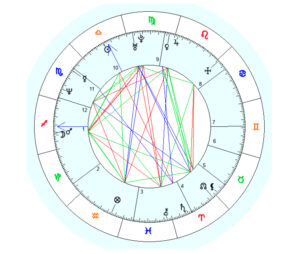Unlock hidden themes in your life through your birth chart
Regardless if you think astrology is merely mythological – authorities from many disciplines agree that fundamental mythological themes and archetypes are embedded into our culture. Astrology is one way to access what might otherwise be hidden from us.
In this article:
- How to interpret your birth chart summary
- Astrology Symbols used in a birth chart
- The main components of a birth chart reading:
- Generate your Birth Chart
A birth chart or a natal chart is a map of where the planets of our solar system are in relation to the stars at a moment in time. Ancients believed that the planets represented gods and attributed behaviors and events in the Universe to the forces that shaped life.
Carl Jung, the famous psychologist believed that the mythical archetypes are ingrained into the collective unconscious of the human species and that only the people who could understand themselves and the archetypes could avoid the pain and challenges of living out those same myths.
Today we can use a birth chart as a tool to examine how those themes might be impacting our life, allowing us to:
- Avoid hidden pitfalls and making the same mistakes over and over
- Take advantage of strengths we didn’t know we had
- Learn how to protect our vulnerabilities and call on our warrior selves
- Shape our destiny
- Power-up our life!
Your first step is learning how to read the birth chart.
How to Interpret Your Birth Chart
On the birth chart you will find four main groups of information which are combined together and interpreted to give a more in-depth reading:
- Planets (the main players) that we all have in our lives
- Signs (the characteristics that infleunce your particular planets)
- Aspects (defines the relationships between the planets) and our areas of stregths and challenges
- Houses (areas of every day life) where these play out in our lives
Our birth chart report will give you interpretations by Allen Edwall about what a certain planet in a particular sign means, along with the aspects and houses.
However, to get a full picture, you need to interpret the details to get an idea of the bigger picture. Determining dominant planets and signs in a birth chart will give you the major themes of your life in particular.
Determining dominant planets and signs
The first step to making sense of a birth chart is being able to understand what the symbols represent:
Symbols on a birth chart
Planets
We all have the same planets in our birth charts that represent areas of what it means to be human. But it’s where they are when we are born and puts us in sync with the life forces in the Universe. In a chart you will how your planets are position in relation to the signs, the Houses (arena of everyday life), and to each other.
To the ancients, the planets were gods in the sky. These gods lived out great dramas that reflected real human emotions and experiences. These planets are represented by symbols on the birth chart.
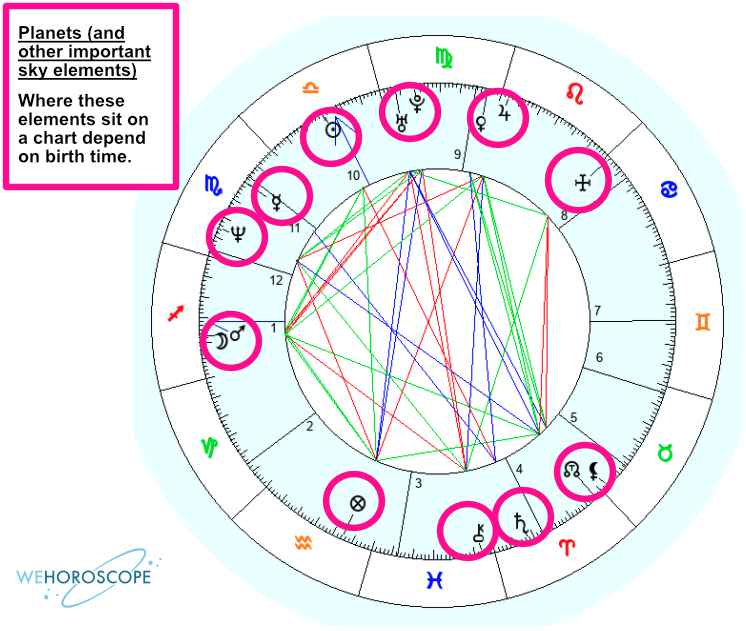
Planets represent mythological archetypes in our collective unconscious.
We tend to think our sign is most important when it really is the planets and luminaries (sun and moon). In reality, your “sign” is the sign that is in the background of the Sun on your date of birth.
Some believe your dominant planets in a Birth Chart are more important than even your sun sign! There are several ways a planet can become a dominant planet. Click here to learn more about how to determine your dominant planets and signs in your birth chart.
If you do NOT know the time of your birth, it is possible your moon sign may be inaccurate and the moon moves into different signs every two to three days. In that case, just make your best guess. But know that your moon will feel effects from the sign next to it in any case.
Planets & points and their meaning
| The Sun | Lifeforce, creativity, basic personality |
| The Moon | Emotions, psychic energy, the subconscious |
| Mercury | Mental energy, communication |
| Venus | Love, harmony, the feminine aspect |
| Mars | Power, physical energy, strength |
| Jupiter | Benevolence, expansive energy, enthusiasm |
| Saturn | Wisdom, restriction, maturity |
| Uranus | Psychic energy, innovation, change |
| Neptune | Calm, sensitivity, wisdom |
| Pluto | transformation, change |
| Chiron | Our earliest and deepest wound, efforts to heal |
| Black Moon Lilith | Sensitivity, shame, inner authority, power, feminine anger |
| Vertex | Fate and destiny |
| Part Of Fortune | Success and health |
| True Nodes | Perceptions: North shows what we are here to learn, South represents our past karmic baggage |
| Ascendant | Public self and childhood circumstances |
| Midheaven | Highest aspirations, lifetime achievement, legacy |
Signs
Signs lend characteristics to the planets
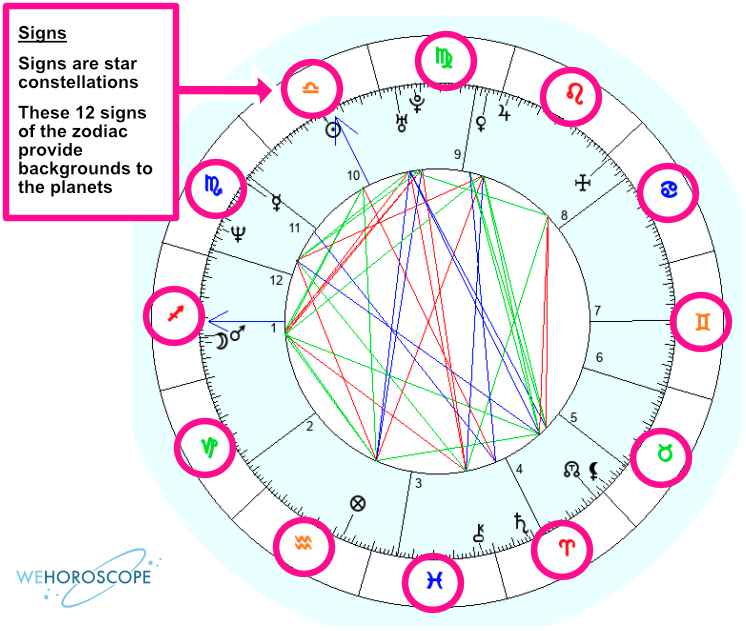
Astrology signs actually represent constellations of stars and some of their qualities come from the meaning of how their shapes were interpreted. They represent human qualities. Over thousands of years, these qualities have become embedded in our collective unconscious.
While the earth moves in relation to the stars, the earth and planets also move in relation to each other.
On any given day a constellation of stars will be in the background of a particular planet shaping areas of our life with particular characteristics that can cause us problems or work for us.
Given that the seasons really do change life for us all and those around us, and the time when we are born can affect how well we might resist or cope with certain health concerns, it has been away for humans to forecast possibilities for centuries by looking at the patterns in the sky. A planet appearing in a constellation (sign) meant various changes were coming.
It is the dominant planets and signs in your life that point to themes in your life, and this must be interpreted by you or an astrologer to get real meaning and actionable insights from your birth chart.
While each planet and the signs they are in have an influence, some signs are more dominant than others.
Click here to learn more about your dominant planets and signs.
Planetary Aspects
Aspects describe the quality of the relationship between the planets
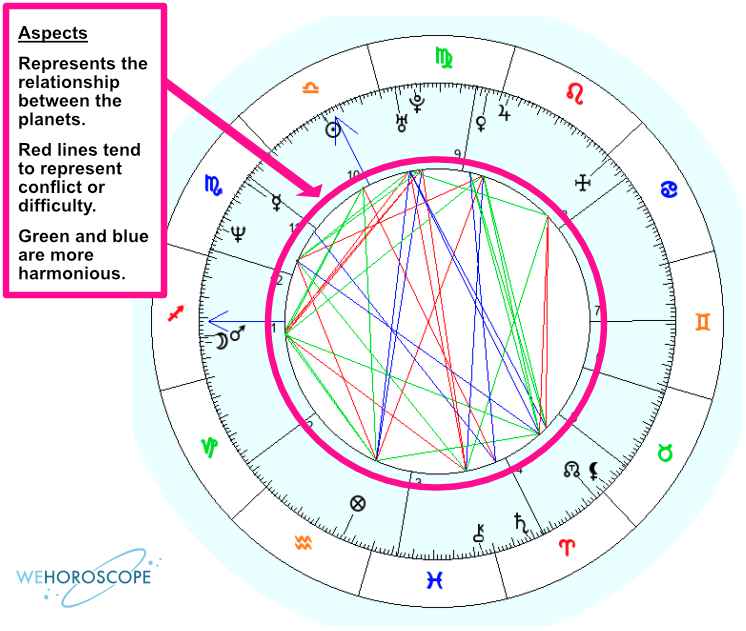
Aspects are described by certain angles and established distances between the planets. The aspects are plotted between planets in your birth chart and represented by colored lines drawn within the circle.
Aspects and their Meaning
Hard aspects represent challenges, difficulties, and conflicts (represented by red lines on the birth chart).
Easy aspects represent opportunities for growth and development(represented by blue lines). There are many aspects to a birth chart but these below are the ones that appear to have the most influence on a person or event.
- Opposition (separated by 180 degrees) represents difficulty
- Square (located 90 degrees from each other) represents tension
- Conjunction (8 degrees from each other) implies internal conflict
- Trine (120 degrees apart) represents harmony.
- Sextiles also are seen as beneficial.
- Quincunx are less important but suggest the planets have nothing to do with one another. This could describe awkwardness or discord or lack of understanding. It may also suggest a denial or the tendency to compartmentalize.
In some charts, the planets are very close to one another. In this case, the qualities of planets are blended together.
Houses
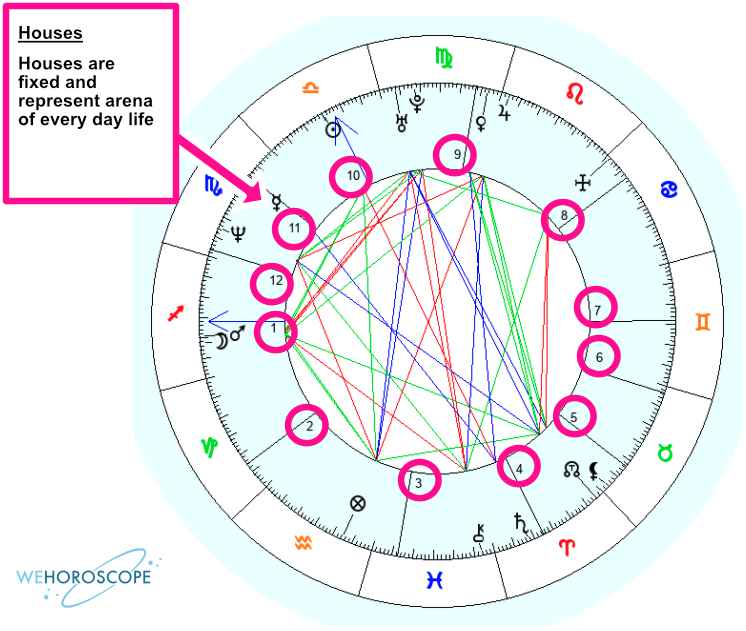
There are 12 houses ** that are each numbered and each house represents a different aspect of everyday life such as career or family life. This allows astrologers to determine life situations where the particular planet’s influence may be felt in your life.
The four most powerful houses are the “Angular Houses” which are the 1st, 4th, 7th and 10th houses. Planets near these houses are more powerful than others.
If there are no planets in a given house, it simply means that your life themes are not naturally defined by this aspect of life.
Houses and their meaning
| First House | House of Self The Self Outward behavior: What is unique about an individual’s temperament, disposition, appearance, and level of self-awareness, identity |
| Second House | House of Value Reveals what is important to a person, morals, attitudes towards money and possessions, how they are acquired and used, priorities, work ethics |
| Third House | House of Communication Perception, thinking, communication, sibling relationships, and short journeys |
| Fourth House | Home and Family Home, roots, emotional foundations, views on security, has a bearing on parents, particularly the mother and nurturing. |
| Fifth House | House of Pleasure Governs creativity, children, romance, objects of one’s affection, child-like spirit, pleasures such as the holidays, the arts, sports, and gambling. |
| Sixth House | House of Health Work and health, service to the community, attitudes towards subordinates, health |
| Seventh House | House of Partnerships Feelings towards close relationships, marriages, not only emotional pairings but work relationships, drive for connection. |
| Eighth House | House of Death and Sex Life processes, including sex, conception, birth, and death. Also governs money or investment in others, as well as the inheritance of possessions or traditions. Can also represent the act of letting go, de-cluttering, letting go of the old to make way for the new. |
| Ninth House | House of Philosophy The search for meaning. Religion and philosophies, rules extensive journeys of the mind, body, and spirit and desire to explore outside of one’s own culture, Governs higher education, language, and law. Reflects the drive to organize information into systems. |
| Tenth House | House of Social Status Ambitions and the desire for a standing in our communities, the roles in our family and workplaces. Governs the parents, particularly the father and his relation to work. |
| Eleventh House | House of Friendships Friends, hopes, and wishes. Influences a person’s creativity in social situations and social awareness. It represents connection, selflessness, appreciation, empathy and trust, tolerance of others, and gratitude. It may also represent the ability to be one’s self. |
| Twelfth House | House of Self-Undoing Unconscious desires, secrets, gossip, fear, lies, envy, anger, feelings of helplessness, or trapped. Includes the denial of responsibility, personal power. Self-sacrifice, service to others, and the need for seclusion. It encompasses all kinds of confinement both in the world, and internally; including the privacy and unconscious, dreams, hidden problems, and. secret enemies. |
** On the Birth Chart below, you will need to enter the time of your birth to determine what planets fall in which houses.
However, if you do not know your birth time, you can still use the chart; but you will miss out on some key information. All the aspects, planets, and the signs that are in the background will probably be correct, with a possibility of the moon and moon aspects being off, as the moon changes sign every two to three days.
Alternatively, if you don’t know the time you were born, you could try this app to do a birth chart rectification. It will take you through possible qualities and significant moments in your life to calculate possible times you were born.
Combining all the many elements of the birth chart to power-up your life
In life, we continue to make the same mistakes, get stuck in ruts, practice the same bad habits, or feel like something is missing. Our birth charts show us why that might be.
Interpreting how all of the elements together is an important part of the astrologer’s job, but you can do it as well.
Imagine that the planet Saturn was found in Aries in the first house. But it was the opposite (opposition aspect) to Mars in the seventh house of Libra. Astrologers might interpret this as a defining aspect of this birth chart. This interpretation might include a strong conflict between the desire to be alone and self-contained and the aggressive pursuit of others.
If you were to learn that this is part of a major theme in your life, you can take steps to ensure you get just the right amount of alone time or the right kind of experiences with people. Communicating this conflict may help significant people in your life understand you better and avoid taking your conflict personally creating more harmonious relationships.
Depending on the houses these conflicts fall in, instead of just letting fate direct people into your life, you can take steps to choose activities or career paths that you can excel at, like sales, leadership, therapy provider, politics leading to more abundance and success in life. Or you might take a more or less proactive role in your family life or love life leading to deeper more fulfilling relationships. It may even be affected by the thoughts and experiences you let yourself have in your mind, the kind of movies or books that satisfy you, or the kind of education that will excite you and ultimately lead you towards giving your life more meaning.
If you find that you are not interested in dealing with people or you are lonely despite this being in your chart, it might be because the balance is off, you likely need more alone time to become your best self, or need a different set of people in your life. Often it means we struggle to embrace both of these qualities and there may be other areas of the chart that suggest why this might be.
It is a good practice to refer back to our birth charts and reinterpret them based on our current circumstances for new insights whenever you are looking for answers.
Accepting these conflicts and nurturing these areas in your life is part of the path toward living a more authentic life.
In areas where there are harmonious and beneficial aspects, you can combine areas of your life to become more super-charged in areas, to become more clear on what your life mission is, what your vocations might be, and how to make the most of your life for you and for others.
Take advantage of these aspects to develop more effective coping strategies and manage stress; facilitate growth to be your best self, impress and attract others and create a fulfilling life with abundance in every form.
See an example of a more in-depth birth chart reading here.
Be sure to check out our Daily Horoscopes for fun as well!
Birth Chart & Report

